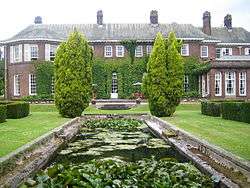Burton Manor
- For the house of a similar name near Tarvin see Burton Hall
| Burton Manor | |
|---|---|
|
Burton Manor from the garden with the orangery on the right | |
| Coordinates | 53°15′35″N 3°01′43″W / 53.2596°N 3.0285°WCoordinates: 53°15′35″N 3°01′43″W / 53.2596°N 3.0285°W |
| OS grid reference | SJ 315,741 |
| Built | c. 1805 |
| Built for | Richard Congreve |
| Restored | 1904 |
| Restored by | Henry Neville Gladstone |
| Architect | Sir Charles Nicholson (restoration) |
Listed Building – Grade II | |
| Designated | 22 March 1974 |
| Reference no. | 1387802 |
 Location in Cheshire | |
Burton Manor is a former manor house in the village of Burton, Cheshire, England. It is recorded in the National Heritage List for England as a designated Grade II listed building.[1] [lower-alpha 1]
History
The house was built around 1805 for Richard Congreve and remodelled in 1904 by Sir Charles Nicholson for Henry Neville Gladstone, son of William Ewart Gladstone. An orangery was added in 1910 to a design by Arthur Beresford Pite.[1] Formerly a private house, it became an adult education college with accommodation for resident students, operated by Liverpool City Council.[2] It closed as an adult educational college in March 2011.[3] Since its closure the organisation known as the Friends of Burton Manor has been formed to restore the manor and its associated buildings.[4]
Architecture
The house is built in ashlar and hammer-dressed red sandstone with a roof of green slates. The chimney stacks are tall and ornate, built of stone and brick. The plan of the building is quadrangular with a central courtyard.[1] The authors of the Buildings of England series consider it to be a "classical design of no great force" and state that its most attractive feature is the small inner courtyard.[5]
External features
The former coach house is listed at Grade II,[6] as are the boundary walls, gate piers and library.[7]
Garden
The garden was designed in the early 20th century as a formal garden. It was designed by T. H. Mawson with a pool, lawns, and terraces with views over extensive parkland. It is listed Grade II on the National Register of Historic Parks and Gardens.[8][9] The ice house in the garden is listed at Grade II,[10] and is a scheduled monument.[11]
See also
Notes
- ↑ Burton Manor no longer runs as a residential college and is currently closed, pending sale and redevelopment. The walled garden is open to the public and is administered by the Friends of Burton manor Gardens, see www.burtonmanorgardens.org.uk or www.burtonmanor.org.uk.
References
- 1 2 3 Historic England, "Burton Manor and attached Orangery (1387802)", National Heritage List for England, retrieved 2 April 2012
- ↑ Bartlett, David (13 September 2010), "Burton manor college future in doubt as Liverpool Council prepares to cut funding", Liverpool Daily Post, Liverpool: Trinity Mirror, retrieved 15 March 2011
- ↑ Burton Manor College, Neston Town Council, retrieved 14 June 2011
- ↑ Friends of Burton Manor, Neston Town Council, retrieved 2 April 2012
- ↑ Hartwell, Clare; Hyde, Matthew; Hubbard, Edward; Pevsner, Nikolaus (2011) [1971], Cheshire, The Buildings of England, New Haven and London: Yale University Press, p. 197, ISBN 978-0-300-17043-6
- ↑ Historic England, "Former coach of Burton Manor (1387804)", National Heritage List for England, retrieved 2 April 2012
- ↑ Historic England, "Front boundary wall, gate piers and Library at Burton Manor (1387805)", National Heritage List for England, retrieved 2 April 2012
- ↑ Parks & Gardens UK: Burton Manor, Parks & Gardens Data Services, retrieved 27 January 2010
- ↑ Historic England, "Burton Manor (1001422)", National Heritage List for England, retrieved 4 July 2013
- ↑ Historic England, "Ice house approximately 75 metres south west of Burton Manor (1387806)", National Heritage List for England, retrieved 4 July 2013
- ↑ Historic England, "Icehouse 110m south west of Burton Manor College main building (1016918)", National Heritage List for England, retrieved 4 July 2013
Further reading
- de Figueiredo, Peter; Treuherz, Julian (1988), Cheshire Country Houses, Chichester: Phillimore, pp. 220–222, ISBN 0-85033-655-4
